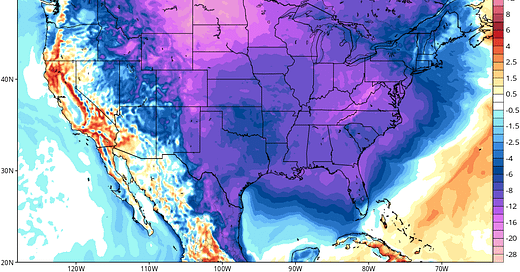Thailand's Unusual Chill; Drought Of '77 Blamed On Cooling; America's Arctic Outbreak, Updated Forecast; + Sense
The 'Polar Vortex' is breaking loose.
Thailand's Unusual Chill
Thailand is enduring unusual cold, with a high-pressure system from China sending temperatures tanking. This rare phenomenon, similar to a 'polar vortex', has disrupted typical weather patterns, and has left much of SE Asia shivering.
On Jan 13, Sakon Nakhon logged a low of 6.6C (43.9F), one of the coldest temperatures in years. While in Bangkok’s Bang Na district, thermometers read 15.2C (59.4F), far below the usual 23-33C (73.4-91.4F) range for this time of year.
The Thai Meteorological Department expects the cold to linger into mid-February, with even March and April, typically Thailand's hottest months, currently forecast to hold cooler than normal. An early rainy season, influenced by La Niña, is also on the cards.
Drought Of '77 Blamed On Cooling
The drought of 1977, which affected much of the U.S., particularly western states like California and Montana, was one of the most significant droughts of the 20th century, impacting agriculture, water supplies, and ecosystems.
It was blamed on global cooling and expanding polar ice:
Politicians and experts of the time went further and all, warning citizens of a chilling future, urging action against the looming threat of a colder, drier world. Fast-forward a few decades, and now droughts are blamed on global warming and shrinking polar ice.
I don’t think we’re witnessing evolving science here, merely evolving rhetoric tailored to fit the crisis of the day. The narrative appears as cyclical as the climate itself, as fickle as the weather. Yet the pattern remains: extreme weather events are consistently used to stoke fears of imminent catastrophe.
America's Arctic Outbreak, Updated Forecast
The 'Polar Vortex' —a recent term for the circulation of frigid air in the upper atmosphere— is breaking loose, allowing Siberian cold to cross the Arctic and spill into North America. This pattern will bring record lows and unusual snows from the Mid-Atlantic to the Gulf Coast.
Keep reading with a 7-day free trial
Subscribe to Electroverse Substack to keep reading this post and get 7 days of free access to the full post archives.




